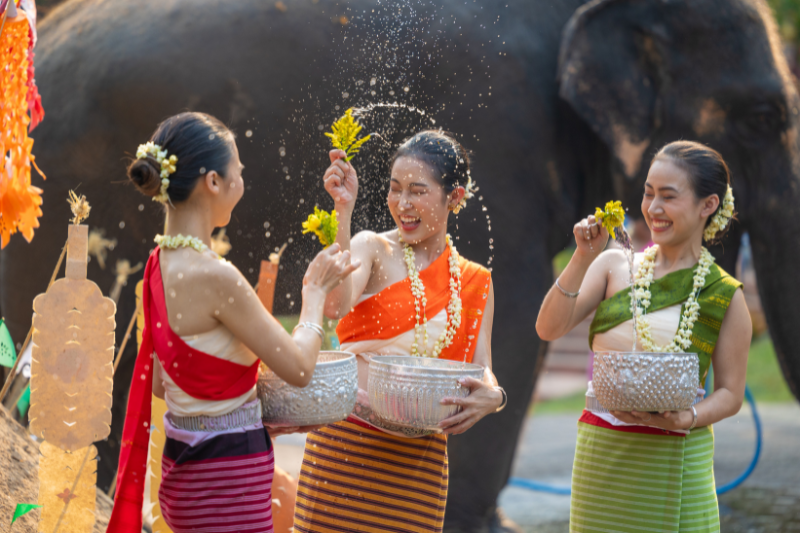Songkran is one of the most important and widely recognized festivals in Thailand. Known as the Thai New Year, it’s celebrated with water splashing, making merit, and pouring water over the heads of elders. Beyond the joy of celebration, Songkran is deeply rooted in tradition and beliefs that date back centuries. This article delves into the history and significance of Songkran in Thailand, providing insight into why this festival is so cherished.
Songkran is a festival that marks the beginning of the Thai New Year based on the Thai lunar calendar, typically celebrated in mid-April. This time coincides with the solar transition of the sun into Aries, which symbolizes the start of a new season and is seen as an auspicious period for renewal and growth.
Originally, Songkran was a celebration of the seasonal changes, specifically the end of the dry season and the start of the rainy season. Ancient Thai beliefs held that during this time, gods and ancestral spirits would descend to the human world, and so, the festival was seen as a way to honor these spirits through merit-making and paying respects to elders.
Songkran’s roots can be traced to Hindu festivals, particularly those celebrating the change of seasons. The word “Songkran” is derived from the Sanskrit language, meaning “movement” or “change,” referring to the movement of the sun into Aries (the beginning of summer in Thailand). This connection to Hinduism underscores Songkran’s religious and cultural significance as it marks a time of spiritual renewal and purification.
Over the centuries, Songkran has evolved to reflect cultural shifts and local customs. Originally, the festival involved simple acts of pouring holy water over images of Buddha or elders as a symbol of cleansing. Over time, these traditions grew into larger celebrations, including water fights, street parties, and public gatherings, transforming Songkran into a joyful and lively event.
Songkran is the official Thai New Year, marking the start of a new year on the Thai lunar calendar. Unlike the Gregorian calendar, which celebrates New Year’s Day on January 1st, Songkran provides an opportunity for Thais to reflect on the past year, make merit, and hope for a prosperous future. It’s seen as a time of renewal, where people look forward to a fresh start, filled with fortune and happiness.
One of the key traditions during Songkran is making merit. Thais visit temples to offer alms to monks, participate in merit-making rituals, and engage in acts of kindness such as releasing fish or birds. It’s believed that these actions help cleanse bad karma and bring good fortune for the year ahead.
Another important custom is pouring water on elders’ heads as a symbol of respect and to ask for their blessings. This is a traditional way of showing gratitude and honoring the wisdom of older generations. It’s also a reminder to preserve cultural values such as respect for one’s elders and the importance of family.
Songkran is often seen as a time for family reunions. Many Thais travel back to their hometowns to visit their parents and relatives, making the festival a significant event for strengthening family ties. It is a time to reconnect, reflect on the past year, and share positive experiences with loved ones.
Although Songkran is deeply spiritual and cultural, it is also a time of great joy. Water fights, street parties, and public celebrations are held across the country, making it an exciting and interactive event for both locals and tourists. The act of splashing water symbolizes the cleansing of bad luck and negative energy, allowing individuals to start the new year with a sense of renewal.
The water fights have become one of the most anticipated aspects of the festival. In cities like Bangkok, Chiang Mai, and Phuket, streets are transformed into arenas for large-scale water battles where people of all ages participate. The fun and playfulness of these activities make Songkran an event that people of all generations enjoy.
Songkran is not just about the excitement of water fights or the festivities. It is a deeply rooted cultural and spiritual celebration that highlights important values such as respect for elders, the importance of family, and the act of making merit for a prosperous future. Whether it’s through the joyful water splashing or the meaningful acts of respect and worship, Songkran serves as a reminder to reconnect with our roots, honor our traditions, and start anew with good intentions.
Songkran is much more than just a new year celebration—it is a festival that represents spiritual renewal, family bonds, and the hope for a bright and prosperous future.
Contact us to book a car. https://www.bkktransfer.com

Suvarnabhumi Airport
Don Mueang Airport
Bangkok Airport
© 2024 Created with www.bkktransfer.com